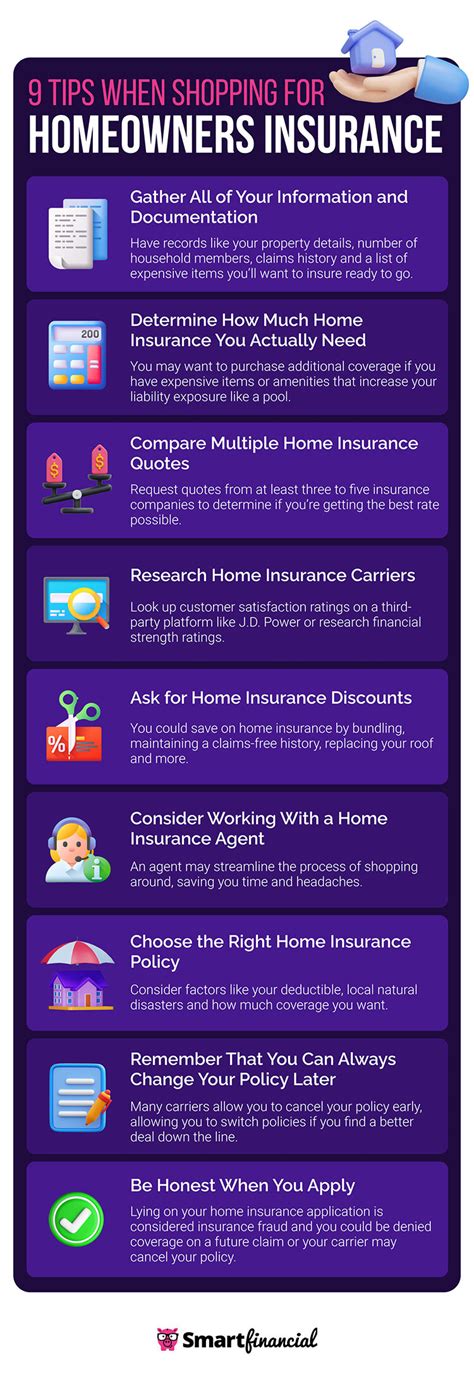How To Shop For Home Insurance

Securing the right home insurance is crucial to protect your valuable assets and ensure peace of mind. With a myriad of options available, knowing how to navigate the process effectively is essential. This comprehensive guide will walk you through the steps to make informed choices and find the perfect home insurance policy for your needs.
Understanding Your Home Insurance Needs

The first step in shopping for home insurance is to assess your specific requirements. Every home and homeowner is unique, and your insurance needs will depend on various factors. Consider the following aspects to get a clear picture:
- Property Value: Determine the market value of your home, including any recent improvements or renovations. This will help you insure your property adequately.
- Personal Belongings: Take inventory of your possessions and estimate their total value. This is crucial for ensuring that your belongings are covered in case of theft, damage, or loss.
- Liability Risks: Evaluate potential risks associated with your property, such as accidents on your premises or damage caused to others. Adequate liability coverage is essential to protect your financial well-being.
- Location and Environment: Consider the geographical location of your home and any associated risks, such as natural disasters, crime rates, or proximity to water bodies. These factors can influence the cost and coverage of your insurance policy.
- Additional Coverage Needs: Identify any specific coverage requirements, such as protection for high-value items like jewelry, art, or collectibles. Consider unique circumstances like home-based businesses or rental properties.
By thoroughly understanding your needs, you can tailor your insurance search and make more informed decisions.
Researching and Comparing Insurance Providers

Once you have a clear idea of your insurance needs, it’s time to explore the market and compare various providers. Here’s how to go about it:
Online Comparison Tools
Utilize online platforms and insurance comparison websites to quickly gather quotes and compare policies. These tools allow you to input your information once and receive multiple quotes from different insurers, making the process efficient and convenient.
Check Provider Reputation
Research the reputation and financial stability of insurance companies. Look for reviews, ratings, and customer feedback to ensure the provider has a strong track record of customer satisfaction and prompt claim settlements.
Evaluate Coverage Options
Examine the coverage options offered by each provider. Ensure that the policies provide adequate protection for your home and belongings, including coverage for specific risks like floods, earthquakes, or theft. Consider the policy limits and any exclusions that may apply.
Understand Policy Terms
Carefully read and understand the policy terms and conditions. Pay attention to details such as deductibles, coverage limits, and the claims process. Make sure you’re comfortable with the terms and that they align with your expectations.
| Provider | Coverage Limits | Deductibles | Customer Satisfaction |
|---|---|---|---|
| Provider A | $1,000,000 | $500 | 4.8/5 |
| Provider B | $750,000 | $1,000 | 4.5/5 |
| Provider C | $1,200,000 | $750 | 4.9/5 |

This table provides a snapshot of key features for three insurance providers. However, it's important to delve deeper and compare more detailed policy information.
Customizing Your Home Insurance Policy
Every homeowner’s situation is unique, and standard insurance policies might not provide the exact coverage you require. Here’s how to tailor your policy to meet your specific needs:
Optional Endorsements and Riders
Many insurance providers offer optional endorsements or riders that can be added to your policy to enhance coverage for specific risks or high-value items. These add-ons can provide additional protection for valuable possessions like jewelry, artwork, or electronics.
Adjusting Coverage Limits
Review the coverage limits provided by your insurance policy. If you have made significant improvements to your home or acquired new, valuable possessions, consider increasing your coverage limits to ensure adequate protection.
Consider Deductible Options
Deductibles are the amount you pay out of pocket before your insurance coverage kicks in. Opting for a higher deductible can reduce your premium, but it’s important to choose a deductible that you’re comfortable paying in the event of a claim.
Review and Update Regularly
Home insurance policies should be reviewed and updated periodically to ensure they align with your changing needs and circumstances. This is especially important if you’ve made significant changes to your home or acquired new possessions.
The Claims Process and Customer Service
Understanding the claims process and evaluating customer service is crucial when choosing a home insurance provider. Here’s what to consider:
Claims Handling Process
Research and ask about the insurer’s claims handling process. Look for providers with a reputation for prompt and fair claim settlements. Inquire about their average response time and the steps involved in filing and resolving claims.
Customer Service Accessibility
Ensure that the insurance provider offers convenient and accessible customer service. Check their availability through various channels, such as online portals, phone, email, or live chat. A responsive and easily accessible customer service team can make a significant difference during times of need.
Claim Satisfaction
Read reviews and testimonials from existing customers to gauge their satisfaction with the claims process. Positive feedback and a high claim satisfaction rate are indicators of a reliable insurance provider.
Making the Final Decision

After thoroughly researching and comparing your options, it’s time to make a decision. Here are some final considerations:
- Balance Cost and Coverage: Strive to find a policy that offers comprehensive coverage at a competitive price. Don't sacrifice essential coverage to save a few dollars.
- Reputation and Stability: Choose a reputable insurance company with a strong financial standing. This ensures that the provider will be able to honor your policy and pay out claims in the future.
- Personal Preferences: Consider your personal preferences and comfort level with the insurance provider. Do you prefer a more traditional approach or a tech-driven, digital experience? Choose a provider that aligns with your preferences.
Additional Tips for Homeowners
Here are some extra tips to enhance your home insurance experience and protect your valuable assets:
- Maintain Your Home: Regularly maintain and improve your home to reduce the risk of accidents and damage. Well-maintained homes often qualify for better insurance rates.
- Document Your Belongings: Create a detailed inventory of your possessions, including photos and receipts. This documentation will be invaluable in the event of a claim.
- Understand Exclusions: Read your policy carefully to understand any exclusions or limitations. Be aware of what is not covered to avoid any surprises during a claim.
- Review Regularly: Set reminders to review your insurance policy annually or whenever your circumstances change significantly. This ensures that your coverage remains up-to-date and relevant.
How much home insurance do I need?
+The amount of home insurance you need depends on the value of your home and belongings. As a general rule, your insurance coverage should be at least 80% of your home’s replacement cost. However, it’s recommended to consult with an insurance professional to determine the appropriate coverage limits for your specific situation.
What factors affect the cost of home insurance?
+The cost of home insurance is influenced by various factors, including the location of your home, its construction type, the coverage limits you choose, and your deductible amount. Additionally, your credit score and claims history can impact your premium rates.
What should I do if I’m unsure about my home insurance needs?
+If you’re unsure about your home insurance needs, it’s best to consult with an insurance professional. They can assess your unique situation, provide personalized advice, and help you understand the various coverage options available.



